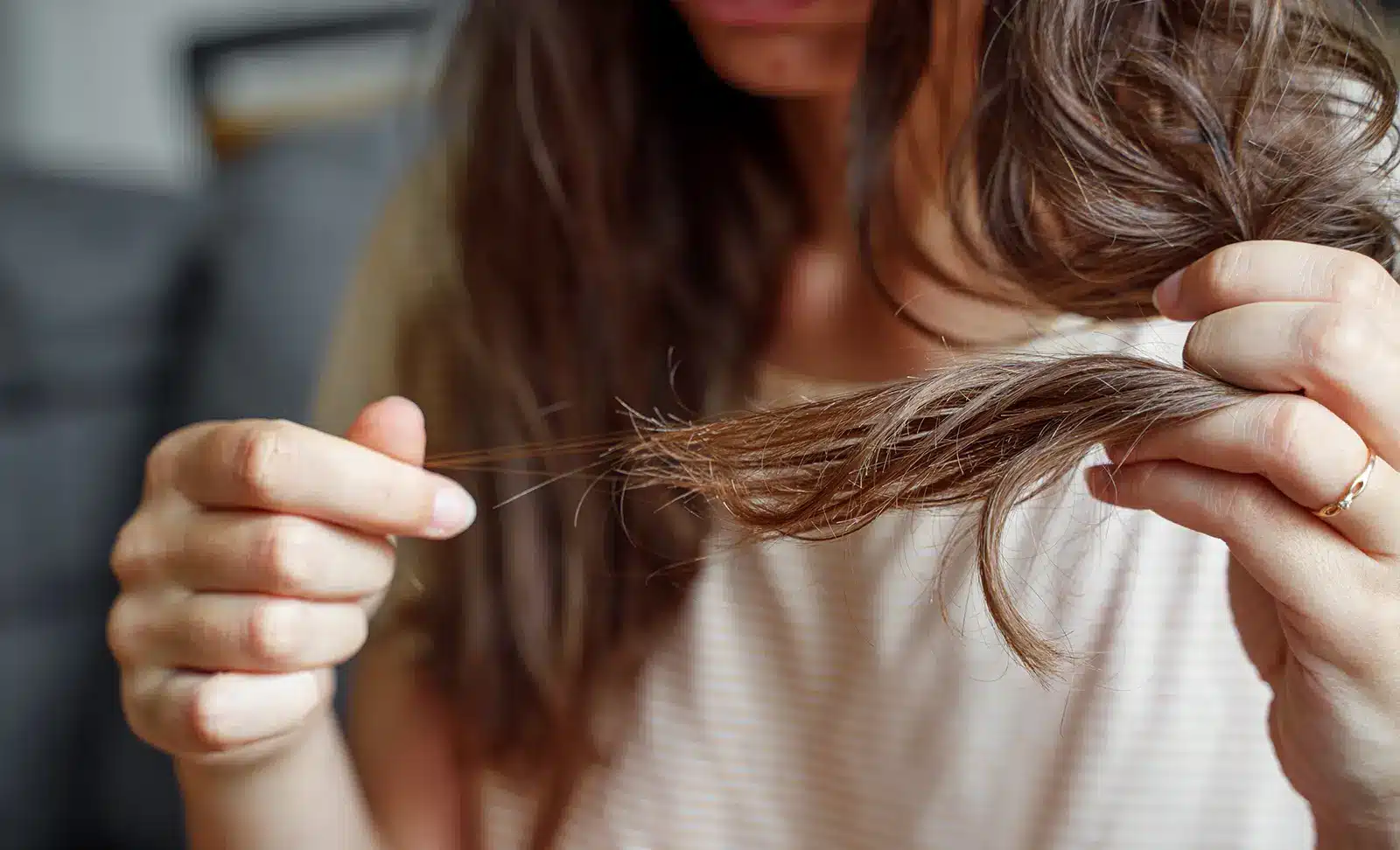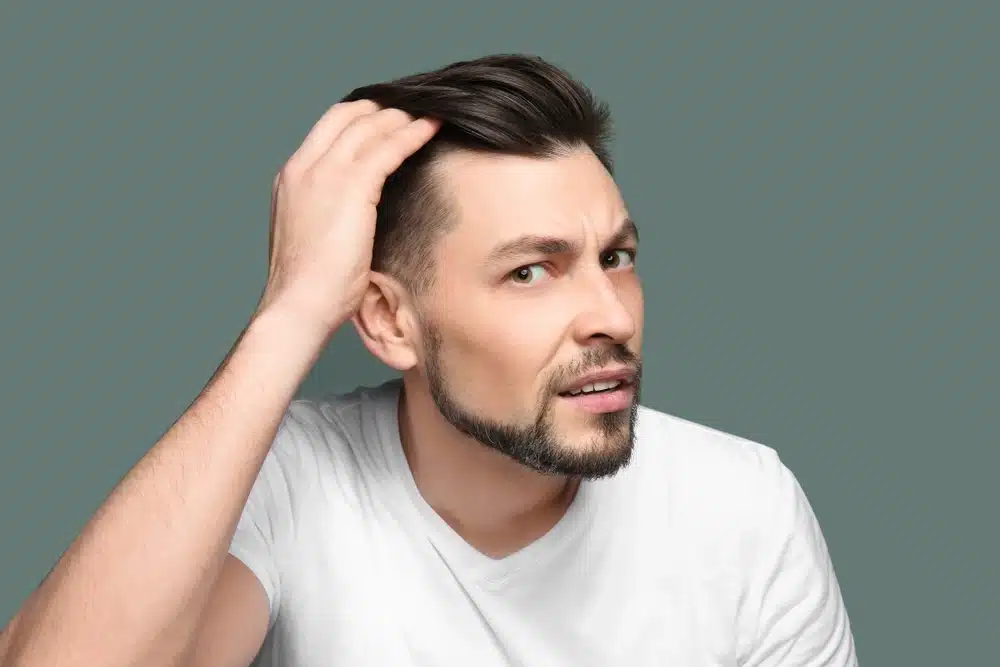If you suddenly notice clumps of hair coming out in your fingers or more hair than usual clogging your drain, you may start to worry. Hair loss is very common, after all, and it can be hard to pinpoint the exact reason it’s happening. One potential cause may be anaemia, a common condition that leads to unpleasant symptoms.
Are you experiencing anaemia hair loss? Wondering, is that even possible? Keep reading to learn all you need to know about the link between anaemia and your hair right here.
What is Anaemia?
Let’s start with what anaemia actually is. In simple terms, anaemia is a severe iron deficiency. It develops when a person does not have enough iron in their body, whether that’s due to blood loss, a bone marrow disorder, or nutritional deficiencies. Iron is a particularly important mineral, as it carries oxygen around the body and ensures your red blood cells function properly. It’s so essential that anaemia can even be fatal when left untreated.
Can Anaemia Cause Hair Loss?
Yes – anaemia can definitely cause hair loss. It is due to the reduced oxygen supply; when there isn’t as much haemoglobin to carry oxygen around the body, the body will prioritise vital organs like the heart and lungs. [1] As a result, the hair follicles will not receive the oxygen levels necessary, which disrupts the hair growth cycle and causes the hair to fall out. It’s common for people with anaemia to experience weaker strands, too.
Who is At Risk of Anaemia?
Anyone can get anaemia and experience anaemia hair loss, but some are more at risk than others.
Menstruating Women: During the menstrual cycle, women can lose a lot of blood. Iron is contained in that blood, and losing too much can cause an iron deficiency.
Children: Children are also more likely to experience an iron deficiency compared to an average adult. That is usually because of a diet not rich enough in iron, which they need a lot of due to their rapidly growing bodies.
People with Restrictive Diets: People who eat a restrictive diet may find it challenging to get all the iron they need. One example is a vegan diet. While it’s more than possible to get all the nutrients necessary with a vegan diet, it can make it easier to become deficient due to food restrictions.
People with Blood and Bone Marrow Diseases: Certain diseases increase a person’s chances of getting anaemia. Some include sickle cell anaemia, [2] leukaemia, and thalassemia.
People Who Use Certain Medications: Certain medications can cause an iron deficiency. These include antibiotics, blood thinners, and anticonvulsants.
People Who Undergo Surgery: Major surgery can lead to anaemia due to a loss of blood during the procedure.
Symptoms of Anaemia
Here are the most common symptoms of anaemia to watch out for:
- Pale or Yellow Skin
- Fatigue (often exhaustion)
- Strange Cravings
- Frequent Headaches
- Loss of Appetite
- Brittle Nails
- A Sore Tongue
- Light-headedness
- Heart Palpitations
If you experience even one symptom of iron deficiency, it’s best to speak with your doctor.
Getting Anaemia Diagnosed
An anaemia diagnosis always starts with a doctor’s appointment, which is why it is so important to speak with your doctor if you show any signs of an iron deficiency, whether that means losing your hair or experiencing extreme fatigue.
A doctor can diagnose anaemia through simple blood tests. This blood test will count the blood cells within your blood, measure haemoglobin levels, and see how much iron is in there. In some cases, other tests may be necessary, such as a bone marrow biopsy or a pelvic ultrasound (for excessive menstrual bleeding).
Treating Anaemia
The treatment depends on the severity. Here are some of the most common:
Iron Supplements
Iron supplements contain a specific amount of iron. You will take these daily to keep your iron level at the correct level.
A Blood Transfusion
A blood transfusion is to quickly restore the red blood cells and iron within your blood. This is for serious anaemia – when the blood count is particularly low and potentially life-threatening.
Surgery
If anaemia is caused by internal bleeding, surgery might be necessary to stop the bleeding. This is only in very specific circumstances.
ESAs (Erythropoiesis-stimulating Agents)
ESAs are a specific type of medication that helps the bone marrow produce more red blood cells. This treatment is used for anaemia caused by particular conditions such as kidney disease and HIV.
These are to treat the condition itself – we will go into a good hair loss treatment further below.
Preventing Anaemia Hair Loss
You now know the most common causes, symptoms, and treatments for anaemia, but what about preventing it? Most people do not want to ever experience hair loss. If you are in one of the risk categories, there are ways to reduce your chances of developing an iron deficiency.
Eating Iron Rich Foods
One of the best ways to prevent anaemia is by eating plenty of iron-rich foods. The good news is there are tons of delicious sources of iron to add to your diet, including:
- Red Meat
- Kidney Beans
- Chickpeas
- Dark Chocolate
- Mussels
- Liver
- Eggs
If you struggle to get enough iron-rich foods into your diet, you could look at foods fortified with iron, such as cereals.
Getting Enough Vitamin C
Eating a well-balanced diet is one of the keys to preventing anaemia, and that means getting plenty of vitamin C, which is particularly important as it can help absorb iron. Some foods high in vitamin C include citrus fruits, tomatoes, strawberries, broccoli, and white potatoes. [2] You could also take a vitamin C supplement.
Seeing Your Doctor When Necessary
If you notice any signs of iron deficiency, whether that’s thinning hair, fatigue, brittle nails, or frequent headaches, see your doctor for a blood test. The sooner you get a diagnosis and onto a treatment plan, the less likely you are to experience severe anaemia hair loss, which would then be harder to treat.
Is Hair Loss Caused by Anaemia Reversible?
There is a definite link between iron deficiency and hair loss. The question now is – is it reversible?
There is good news! Hair loss caused by anaemia is 100% reversible, so you can rest assured you can grow out your locks once more. It can take a few months for the hair to grow back, and it may take longer if the anaemia is not treated properly.
Treating Hair Loss Caused by Anaemia
Here are the best ways to treat hair loss caused by anaemia:
Treating the Anaemia
The most effective way is to treat the anaemia. Your hair won’t grow back if you still do not have enough iron in your blood.
Using Minoxidil
Minoxidil is a hair loss treatment that you apply topically to the scalp. It helps stimulate new hair growth by boosting blood flow, awakening the hair follicles, and producing newer, thicker hair. Use a hair track app to monitor the growth.
PRP Therapy
Your doctor may recommend PRP (platelet-rich plasma) therapy. This involves a series of injections (using your own blood) that go into your scalp to stimulate new growth. It works thanks to the high levels of growth factors within the blood, making it an excellent regenerative medicine.
Massaging the Scalp
One of the simplest ways to help stimulate new hair growth is by massaging the scalp yourself. This helps boost blood flow, helping the hair grow back through. Consider using a nourishing oil while you do this, such as castor or jojoba oil.
Protecting Your Strands
If you treat the anaemia, your hair will grow back. In the meantime, protect your strands as much as possible. Use hair masks, deep conditioners, and hair oils to prevent weakness and tangling. You may want to wear a protective hairstyle, too, to help your hair grow in the best condition possible.
What if Anaemia Isn’t the Cause of Your Hair Loss?
What happens if your hair loss doesn’t get better after treating anaemia? In this case, there are other things to look into.
The most common cause of hair loss is androgenetic alopecia, also known as female or male pattern baldness. It is a genetic hair loss that is more common as you age. Particular treatments work well for this condition, including minoxidil, finasteride, and a hair transplant.
If you do not know the cause of your hair loss, it’s best to speak with a doctor.
Anaemia Hair Loss: Final Thoughts
You now know the answer to “Can iron deficiency cause hair loss?”. The answer is yes, it can, with anaemia and hair loss being pretty common. The good news is that hair regrowth after anaemia is possible as long as you treat anaemia at its root cause.
If your hair loss is not caused by anaemia, you may need an alternative hair restoration solution like a transplant. Get in touch with our team today to learn more, or head to our patients gallery to view our past work on our clients.
Sources





